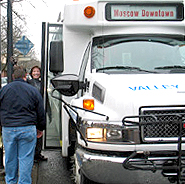![]()

NEWS
ROOM
ITD
News
USDOT News
Associated Press
News
Link
TRANSPORTATION
ORGANIZATIONS
State
of Idaho
ITD Home Page
AAMVA
AASHTO
USDOT
Federal Highways
TRIP
TRB
NTSB
NHTSA
EMPLOYEE
RESOURCES
PERSI
Group Insurance
Regence BlueShield
EAP
Idaho DHR
FINANCIAL
RESOURCES
IDAHY
Credit Union
Pocahy
Credit Union
|
Partnerships pay off for public transit in Moscow A partnership to provide bus service in north-central Idaho is being hailed a success story by public transportation officials. Launched in late January, Moscow’s first scheduled, fixed-route public transportation service is the product of a partnership between Valley Transit (based in Lewiston), the University of Idaho (UI) and the city of Moscow.
“This is a significant success story,” says Larry Falkner, ITD Public Transportation Division Administrator. “It’s a showcase for what local partnerships can do with the state’s help, and what can be accomplished when we get the right people to the table. These are the kinds of partnerships we can put in place in communities around Idaho that really need the service.”
In addition to the funding partnership, on-campus parking fees help pay the bills for the new bus service, which is free to riders. A separate dial-a-ride service requires a fee. It provides door-to-door service for people who otherwise are not able to get to the scheduled bus stops and requires a 24-hour advance reservation. That service provided the foundation for the fixed route, according to La Pointe. The bus service reaches beyond the university district. It also provides service throughout the city of Moscow and connects with service into Pullman, Wash., via the UI-Washington State University shuttle, ultimately creating a more connected region. Still within its first month of operation, an average of nearly 140 people ride the buses every day. That alone is an endorsement of the project’s need, Falkner says. Creating the service has been years in the making. Several years ago, ITD was approached for funding to study public transit needs in the area. Early in the study, results proved an overwhelming need, and research efforts were suspended. The ITD board approved use of the remaining $18,000 study funds for other MVT project needs. Federal designation of Lewiston as an urban area in 2002 freed up rural transportation funds within Idaho’s District 2. Valley Transit, in partnership with the city and the university, competed for and received capital and operating grants totaling nearly $330,000 to provide service in Moscow, which is one of the largest rural communities in the state that doesn’t have a public, fixed-route service. The University of Idaho provided $200,000 in “soft” match, with the money it currently spends on its contract with Wheatland Express to provide transit service to students, faculty and staff. UI and the city combined to provide a “hard” match of more than $60,000. Dan Schoenberg, director of Auxiliary Services at UI, said the new service is another way to assist students, faculty and staff at the institution. “I am very pleased we are able to leverage the funds we already spend with Wheatland Express to provide transportation between Moscow and Pullman to create another transit option for the entire Moscow community,” he said. |
||||||||
|
Return to Transporter Main Page
|
 “The
partnership means everything to us,” says Tom La Pointe,
Valley Transit’s executive director. “The primary
partners in it are the Feds and ITD, but also the locals –
U of I and the city of Moscow also made a significant local
investment.”
“The
partnership means everything to us,” says Tom La Pointe,
Valley Transit’s executive director. “The primary
partners in it are the Feds and ITD, but also the locals –
U of I and the city of Moscow also made a significant local
investment.”
